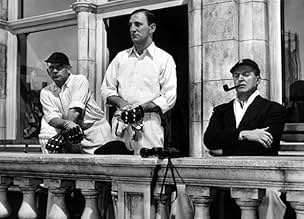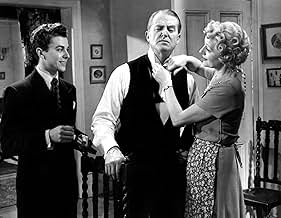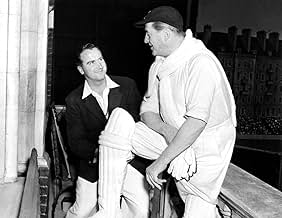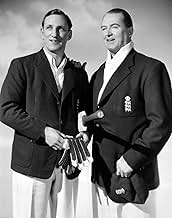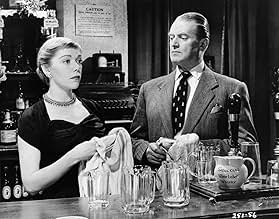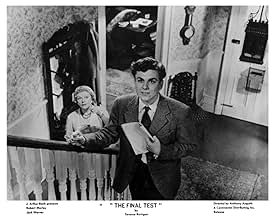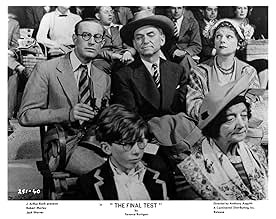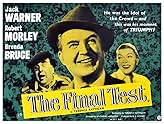Ajouter une intrigue dans votre langueSam Palmer is a cricketer about to play the final test match of his career. His schoolboy son Reggie is a budding poet who disappoints him by not attending the penultimate day's play. Unexpe... Tout lireSam Palmer is a cricketer about to play the final test match of his career. His schoolboy son Reggie is a budding poet who disappoints him by not attending the penultimate day's play. Unexpectedly, Reggie is invited to the home of poet and writer Alexander Whitehead. Reggie fears... Tout lireSam Palmer is a cricketer about to play the final test match of his career. His schoolboy son Reggie is a budding poet who disappoints him by not attending the penultimate day's play. Unexpectedly, Reggie is invited to the home of poet and writer Alexander Whitehead. Reggie fears he will also miss the final day--and therefore Sam's last innings--but it turns out that ... Tout lire
- Réalisation
- Scénario
- Casting principal
- Cricket Match Spectator
- (non crédité)
- Frank Weller
- (non crédité)
Avis à la une
His son wriggles out of watching his fathers final match in order to visit his own hero a poet played by the wonderful Robert Morley.
It is a charming light comedy which deals with the father/son relationship. Morley steals the show, as expected and the ending is suitable happy.
The real tragedy is that this is practically the only film to feature cricket when dozens have been made about baseball. Cricket contains all the metaphor and allegories that exist about life and the universe. In fact it is itself a branch of philosophy which can teach humankind the true path to enlightenment. It is not just an interesting way to hit a ball with a stick!
This film should have been the thin end of a very large and wonderful wedge. John Boormans "Hope and Glory" contains an excellent cricket scene. If anyone can suggest any other films with a cricketing theme I would be pleased to hear from you.
This is a gentle comedy with a touch of drama. If you want to see how comedy works (and you understand cricket) watch the first 5 minutes. Senator Stanley Maxted arrives in England and makes his way to the Oval where he poses a few questions to deadpan Richard Wattis. The questions are standard cricketing enquiries (you mean they play for 5 days and it might still be a draw?) which could be cheesy but the delivery and Wattis' "matter of fact" responses make you laugh.
Sam's cricketing prowess does not extend to his son who is more interested in poetry and this forms the backbone of the movie – does the son care enough about dad to watch his final innings? At the same time, does dad care enough about his son to appreciate his interests.
Sam not only gives the umpire a lift to the ground but entertains him for dinner the night before (they wouldn't allow it these days you know). Sam also pops down to the local for a drink around closing time during the middle of the game - but he only drinks lemonade so that's alright then. Robert Morley (wearing a rather fetching jump suit) spices up the last third of the film as a vain, muddled poet.
It's directed by Anthony Asquith from a script by Terence Rattigan; originally it was broadcast by the BBC with an entirely different cast. Although Warner and Morley are wonderful, with Morley playing another of his very English eccentrics, it's a little too neatly drawn a script to be among Rattigan's best; in fact, at times it seems derivative of movies like PRIDE OF THE YANKEES. It even has an American character in an effort to let the transatlantic audience have some cultural understanding of this game.
I don't know how successful it was in the theaters, but there's little doubt that when Morley or Warner are on screen, they're lots of fun.
Le saviez-vous
- AnecdotesIn the opening scene, shot in London Waterloo railway station, the film of the locomotive arriving at the platform is flipped left-to-right, as revealed by the mirror-reversed number on the side of the locomotive cab. This was most likely intentional, so that in the next shot the platform is on the same side of the train.
- GaffesAt the end of the first day of England's innings it is said that they scored 320. The next day on the radio, John Arlott says 283.
- Citations
Reggie Palmer: I'm afraid I don't awfully like cricket.
Alexander Whitehead: Don't you really? I have heard of such people.
- ConnexionsRemade as The Final Test (1961)
Meilleurs choix
Détails
- Date de sortie
- Pays d’origine
- Langue
- Aussi connu sous le nom de
- Poslednja provera
- Lieux de tournage
- Pinewood Studios, Iver Heath, Buckinghamshire, Angleterre, Royaume-Uni(studio: made at Pinewood Studios, England)
- Sociétés de production
- Voir plus de crédits d'entreprise sur IMDbPro
- Durée
- 1h 30min(90 min)
- Couleur
- Rapport de forme
- 1.37 : 1

